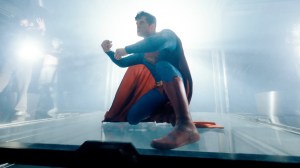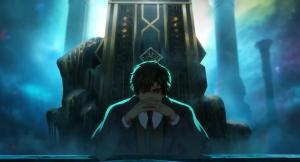Star Trek: Picard debuted its second episode, “Maps and Legends,” today on CBS All Access. In an unexpected turn, actress Isa Briones has played as many characters in those two episodes. Briones is best known for her musical work, such as being a part of the First National Touring Company of Hamilton. Now she’s jumped into one of the biggest television franchises in existence with both feet. The premiere revealed that her first character, Dahj, is the “daughter” of Data, the beloved android from Star Trek: The Next Generation. Following Dahj’s death near the end of the first episode, audiences soon learned that she has a twin sister named Soji.
Videos by ComicBook.com
After seeing today’s new episode of Star Trek: Picard, Comicbook.com spoke Briones about joining Star Trek, playing two characters, and more. You can see what she had to say below.
A quick warning, our interview includes spoilers for today’s new episode of Star Trek: Picard. You may want to check out the episode before reading ahead.

At what point in the process did you find out that you wouldn’t be playing just Dahj, but Soji as well?
Isa Briones: I did not find out that I was playing twins until my final call back and I was always wondering why they were giving me all these notes to like play the character in so many different ways, like kept changing their minds. I was like, what is going on? And then finally I realized, Oh, it’s because I’m playing two people. That’s why. Then I found that out and got to work on crafting the two characters. When we started doing Comicon, we get these sheets that tell us our talking points, what we can and can’t talk about, and the number one thing for everyone was, “Don’t mention Soji! Don’t talk about Soji!” Which is hilarious because that’s who I am for most of the time, so I had to just talk about this one girl that I played for an hour.
What was your reaction when you found out about Dahj and Soji’s connection to Data?
IB: Unfortunately, I didn’t watch a lot of Star Trek in my childhood, which I’m kicking myself about now. I really wish I had because it’s amazing. Now that I’ve gone back, I’m such a huge fan. I don’t think I even really knew that part of it until after I got the job. I was in rehearsal and reading the script and I was like, “Wait, wait, wait, wait. I think I’m related to Data,” which was crazy but that was really cool. Going back to watch Next Generation and getting to see Brent doing his thing and just how incredible he was and it was obvious to see why he was such a beloved character. And they, of course, told me, “You’re not supposed to act like him. Don’t worry, that’s not what you’re supposed to do, but definitely just watch him.” I was so fascinated and interested to see what I could bring of Data into what I was doing in the show.
You’re young enough that Star Trek: The Next Generation was off the air before you were born. Do you think being as young as you are gives you a different perspective on the franchise, its legacy, and these iconic characters you’re working with?
IB: Oh yeah. Part of me says, “Aw man, I wish I had known more of the franchise before,” but there’s another part where it’s cool that I’m coming at it with fresh eyes and coming at it from different experiences because it also means that I connect with the stories in a different way. I feel like the stuff that I do really connect with in the show is the themes of optimism and empathy. Those are really so obvious. Looking at the bigger picture, that’s the heart of Star Trek and having an open mind to other people and an open mind to what the future can be, and I feel like that’s such a sentiment that needs to be accepted right now, and I think shows like this are so necessary and I love that we get to be a part of that and show this universe in a new way with new faces and the new experiences.
There’s been a lot of talk about how Star Trek: Picard reflects our own changing world. You’re playing a synthetic character, and there are a lot of strong feelings about synths in the Star Trek universe. What do you feel those characters are reflecting from our world?
IB: Star Trek and sci-fi in general has always been a nearer to our society, obviously, and I think it is reminiscent of a lot of ideas. But what I very much connect to is the fact that I’m mixed race, I’m Filipino and Swedish and Irish and I feel like getting to do a character like this who has thought that they were human their whole life and then finding out that they are something that is hated by so many people is a really difficult realization and makes it really hard for someone to accept who they are. And I feel that very strongly as someone who is mixed because there are a lot of people who will think that people who aren’t white are less than. And that is very much how I feel the synthetics have been treated. And it’s cool that I get to bring my experience of that into what Soji is going through.
When we meet Soji, she’s working on a Borg cube for the Romulan reclamation project. Can you tell us a bit about how she ended up there and what you feel motivates her to do the work she’s doing?
IB: Soji is an extremely empathetic, caring person who really just seeks to understand other people, and her work on the Borg artifact is exactly that. I mean she’s caring for these ex-borgs in a way that the Romulans don’t want to – they just want their technology – but Soji really seeks to give them meaning and to give them a new life and I feel like she is this ray of light in a very disjointed and broken place, broken in the way that it’s literally a broken borg cube. But she wants to come in and help these people who have never been shown kindness before.
We also see that she’s entered a kind of relationship with Narek, a Romulan at the project. Can you explain what draws here to Narek and into that relationship?
IB: I think she’s been working on the cube for a while, just completely focused on her work and suddenly this new guy she’s never seen before shows interest in what she, in her projects, is doing. And I think we all know that it is a very big part of Romulan culture to be very secretive. So I think she’s a little wary of him and his intentions, but there’s also a certain curiosity because I think she senses, because she is so empathetic, that he’s different and senses that he also wants someone around, wants a connection, and I think she’s very much intrigued by that.
Have you given any thought to the possibility of Soji and Narek become an online fan ship?
IB: I had a feeling as soon as I had read the storyline. I was like, “Oh, people aren’t going to like this.” I know that Harry [Treadaway], who plays Narek, he was afraid that everyone’s going to hate his character because he may not be a good guy. And I was like, “Come on, why do you think everyone loves the Twilight movies? They love a bad boy.” So I think people will probably latch onto this relationship a little bit because of the danger and the passion there. But I think for me what I would like to see is, the lies and the secrecy that are there, it should be the thing that women are like “Uh uh. No, no, get rid of him. No, not that one. Next.”
Playing Dahj, you and Patrick Stewart were outside in sunny California. But now as Soji, you’re on a Borg cube and surrounded by aliens and cyborgs. Does it feel at all like you’ve been thrown into the deep end of the franchise? Did it take some time to adjust to all the sci-fi elements?
IB: What I would say was the deep end was just the fact that I’ve never really done much film and TV before ever. And my very first scene that I ever shot was the one in the vineyard where I’m screaming and crying and that’s the first. So the fact that that was my first ever real experience, I was very nervous and very scared and it was definitely a hard couple of weeks playing Dahj because there was so much intense stuff happening. But I feel like that was the perfect intro into it because you start going full speed ahead and that was so much of a learning experience in those few weeks that when I got to do Soji it felt like, “Okay, I did the really hard bit.” Now I get to kind of just be a normal girl for a second and just be a girl working at the job that she’s passionate about and meeting a new guy, falling in love, whatever. I get to kind of slow down for a second before all the craziness starts again.
There was a lot of action in that first episode where you played Dahj, especially compared to past Star Trek shows. What was it like filming such intense fight scenes? How much of that was you?
IB: The first one I ever shot was actually the last one that you see in the episode. And I trained for that for about a month, month and a half. We have such an amazing stunt team that they were able to teach me a lot of it. I didn’t do the flipping and the throwing people over buildings, that wasn’t quite my thing, but I used to do martial arts, so a lot of the fighting kind of came back to me. It felt kind of second nature once I got into it, which was awesome. I felt like I was living out my action star dream. How often is it that you get to play a character that gets to do all this kick-ass stuff but also has a softer side. She’s such a fully formed character in that I get to do all the action stuff, I get to show her falling in love, I get to show her happy, I get to show her completely alone and frightened. She gets to go through everything and I just feel so lucky that I get to play a character that has all those parts to her.
What are the chances we get to see you living more of that action star dream later in the season?
IB: Well, I don’t know. We’ve seen what Dahj can do. Who knows what Soji can do?
************************
New episodes of Star Trek: Picard become available to stream Thursdays on CBS All Access.
Disclaimer: ComicBook.com is owned by ViacomCBS.









